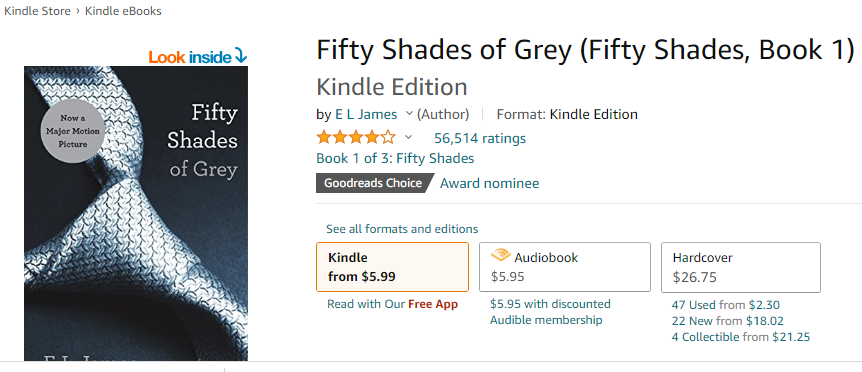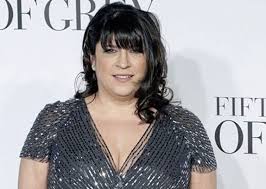 The Fifty Shades of Grey trilogy never was, and never will be, nominated for Pulitzer or Nobel literature prizes. But you can’t argue with Fifty Shades’ incredible commercial success as ebook, print, audio, and film products. It’s been ten years since author EL James released this tale of tension between virginal Anastasia Steele and billionaire bad boy Christian Grey. The passing decade hasn’t stopped the intrigue surrounding the story series. That’s due to the one main reason why Fifty Shades is phenomenally popular with (some) women.
The Fifty Shades of Grey trilogy never was, and never will be, nominated for Pulitzer or Nobel literature prizes. But you can’t argue with Fifty Shades’ incredible commercial success as ebook, print, audio, and film products. It’s been ten years since author EL James released this tale of tension between virginal Anastasia Steele and billionaire bad boy Christian Grey. The passing decade hasn’t stopped the intrigue surrounding the story series. That’s due to the one main reason why Fifty Shades is phenomenally popular with (some) women.
I admit something. I’ve never read the books or seen the films. And I’m not going to. I have absolutely no interest in getting involved in bondage and discipline, dominance and submission, or sadism and masochism (BDSM). The only things I’m ever going to tie up are my shoes, and I can get all the pain I need by accidentally pricking myself with the pin from a Remembrance Day poppy.
The reason I’m writing this is curiosity. I got curious about Fifty Shades’ phenomenal popularity when bumping into a fellow writer the other day. She asked what I was up to—my work-in-progress or WIP as it’s called in the accounting biz. I told her about my series-in-development, City Of Danger.
“Wow!” she said. “Cool concept. Who’s your target market?”
“Educated women, like you, looking for a thrill who’ll pay the bill,” I said.
She giggled. “You could have another Fifty Shades of Grey on your hands. Just add some sex. Kinky sex.” Then she winked and walked away.
She got me thinking. When I got home, I asked Rita (my wife), “Did you ever read Fifty Shades of Grey?”
Rita gave me the over-her-shoulder look. “No. I don’t want to read a badly-written piece of smut.”
“Do you know anyone who has?”
“Melissa read it.”
I smiled. “Melissa would. What’d she think?”
“She liked it.”
“Because…”
“She said it was pornography for women. Mommy porn.”

So down fifty grey rabbit holes I went, researching this popular (some) women’s phenomenon. Part was to unlock the secret of success—how I could cast its spell of marketing magic over the City Of Danger. Part was because I had a DyingWords blog post deadline looming, and I needed an interesting topic. Fifty Shades fulfilled both.
First stop was at Amazon to check some figures. Zon’s stats say the print and ebook versions sold over 150 million copies and that was as of October 2017. If EL James, whose real name is Erika Leonard, made two bucks profit per book (like I do) that put her in the 300-million club not counting film, audio, and translation rights. Not a bad return on a writing investment.
Amazon reviews and ratings count. Trust me. I have twenty products published on Amazon and a few 1-Stars to prove it. Fifty Shades of Grey, the first in the series, has 56,514 ratings/reviews for an average 4 out of 5 stars. 59% are 5. 11% are 4. 9% are 3. 7% are 2. 14% are 1. Amazon doesn’t allow Zero-Star ratings or I’d be able to tell you about mine.
My experience with reviews and written ratings is there’s a love/hate relationship between the reader and the writer. If readers go, “Meh… it was okay…” they rarely bother to mark up a score. The lovers will gush out a praise and carry on reading your other books, while the haters will bitch-slap you and leave.
Seeing as Fifty Shades, Volume One, has 59% of 56,514 people loving it, that’s 31,647 and a half people who didn’t think it was a badly-written piece of smut. I know from my Amazon stats that maybe one in a thousand downloaders leave a rating and far less leave a written review. Takeaway here is Fifty Shades of Grey has something big going for it.

I had to have a look. I clicked Look Inside and read the opening. It starts with Anastasia looking in a mirror. Reflection like this—says every writing guru who ever gurued writing—is a bad way to hook a reader. I moved past this because, in my experience, writing gurus should be making money by writing intriguing books rather than guruing others on how to write indigesting books.
My next impression was that 50SOG (as the interwebbers call it) is in first-person, present-tense. It’s not my style but, then, I’m a Frederick Forsyth fan, not a Fan Fiction fan. Moving on. Dialogue? Passable. Characterization? Anastasia developed right away as a main character. Plot? I could see this was heading somewhere that might be interesting. Editing? Impeccable.
There were a lot of written reviews, so I skimmed the best and the worst:
5-Star: So why give a terrible book five stars? I teach a human sexuality course at a college, and this book is an EXCELLENT example of poor communication, disrespect between romantic partners, and toxicity in a relationship. It also demonstrates some of the false beliefs about S&M that society holds. Honestly, it reads like the author has never been in a healthy S&M relationship. Safe-word much? These are great examples for my students, and we mock the book openly in class.
1-Star: No, just no. When I downloaded this series to my kindle before leaving on a long European adventure, I was reminded of the old saying “if everyone else was jumping off a bridge, would you?” I like sex. And god help me, I liked Twilight. Mostly I loved Wuthering Heights, the book that inspired Twilight and then, this. But, Christian Grey is too young and one dimensional to be that twisted. Even to be a billionaire—it would help if she actually interviewed one. Anastasia is a simpleton, through and through. One thing the book gets right—these two really belong together. I tried to turn off my intellectual understanding and proceeded to take it at just porn-level—but even the love scenes failed to titillate. I only weep for all the trees that were destroyed due to this book.
5-Star: My preferred reading is non-fiction – biographies, history, then if I must – novels based on history. I don’t read romance novels nor watch porn. 23% into this book on my Kindle I was ready to terminate reading it but the author slips a joke in at that point and I got hooked. I’ve read books #2 and #3 a couple of times. I’ve read 50 SHADES a dozen times (and currently); for me the book is like cocaine to an addict. It’s very enjoyable. I think everyone from 17 up should read the book and could have a much more satisfying life through their sex life. I also think that some Lit student(s)/journalist should do a study of hospital emergency rooms inquiring into what might be book related incidents since 2012 when the book came out. Bottom line – enjoy cautiously.
1-Star: I wanted to see what all the hubbub was about and bought this a while back. Started reading it and was not impressed. Mommy porn, for sure. Not at all well written. Ridiculous premise. If this guy lived in a trailer in the woods, no woman would go near him. But because he’s a wealthy man, somehow he’s considered mysterious and sexy. It’s shocking and disturbing that’s such deviance is considered entertaining especially since it essentially deals with sexual slavery.
I left the Amazon page without One-Clicking. My curiosity was satisfied that it was a professionally produced product and the terms “badly-written” and “smut” are entirely subjective, although I highly respect Rita’s taste and judgement. After all, she married me thirty-eight years ago and made it work for both of us.
I jumped to Google. Tap. Tap. Tap. Why… fifty… shades… grey… phenomenally… popular… women. The SERPs served me well—problem was there was so much stuff to wade through and find out the main reason why Fifty Shades was so phenomenally popular with (some) women.

I first focused on the series history and its publishing progression along with marketing management. What I read was a one-in-a-longshot. Sometimes the stars align with a big dose of dumb luck. If they didn’t, as in this case, Fifty Shades would have long been run through the Amazon crusher.
50SOG started as Fan Fiction. I’ve never read anything from this genre and wasn’t exactly clear on what it was. Wikipedia, the Queen of Hyperlinks and who has never let me down, says this:
Fan fiction or fanfiction (also abbreviated to fan fic, fanfic, fic or ff) is fictional writing written in an amateur capacity as fans, unauthorized by, but based on an existing work of fiction. The author uses copyrighted characters, settings, or other intellectual properties from the original creator(s) as a basis for their writing. Fan fiction ranges from a couple of sentences to an entire novel, and fans can both keep the creator’s characters and settings and/or add their own. It is a form of fan labor. Fan fiction can be based on any fictional (and sometimes non-fictional) subject. Common bases for fan fiction include novels, movies, musical groups, cartoons, anime, manga, and video games.
Fair enough. Before Erika Leonard was EL James, she wrote fan fiction under the penname Snowqueen’s Icedragon and posted her episodic first run of 50SOG on fanfic websites under the title Master of the Universe. The series took on a huge following of cult-like loyalists.
 I need to stop for a sec and say something about Erika Leonard. This was not this woman’s first trip to town. She was already in her forties and worked as a film producer by day and a sharp marketer by night. She knew exactly was she was doing by building a fan base—a repeat audience who would keep on buying her episodes and recommend them to others over the internet. It’s now called “word-of-mouse” rather than “word-of-mouth”.
I need to stop for a sec and say something about Erika Leonard. This was not this woman’s first trip to town. She was already in her forties and worked as a film producer by day and a sharp marketer by night. She knew exactly was she was doing by building a fan base—a repeat audience who would keep on buying her episodes and recommend them to others over the internet. It’s now called “word-of-mouse” rather than “word-of-mouth”.
To quote EL James (Erika Leonard) in an interview where she spoke of her shock at the success of the books, “The explosion of interest has taken me completely by surprise,” she said. James had described the Fifty Shades trilogy as, “My midlife crisis, written large. All my fantasies are in there, and that’s it.”
Ms. James/Leonard drafted the 50SOG trilogy on a classic and a current pop-culture phenomenon. She used Beauty and the Beast along with Twilight and replaced damsels and uglies and vampires and werewolves with a straight-laced virgin and a rich guy with some serious sexual issues. Voila! FanFic fans loved it, and the series went viral in internet circles, being read on subscription web pages.
The mainstream was watching. Traditional Publishing is always looking at who’s making money by setting a trend. The first to pick up on 50SOG was a small Australian publisher who bought the rights and put the series out as ebooks. The publisher, Writer’s Coffee Shop, had limited marketing funds and relied on book bloggers to boost sales through word-of-mouse.
E-sales grew and Writer’s Coffee Shop released paperbacks that sold like iced drinks on a blazing day. Part of the success was marketing brilliance from Ms. James/Leonard. She designed her own covers and was adamant that her then-current publisher (and future publisher at Random House) stay away from the cheesy romance tropes of a ripped hunk clutching a hot chick.
If you note Fifty Shades of Grey, Fifty Shades Darker, and Fifty Shades Freed, you’ll see monotones with a tie, a mask, and a pair of handcuffs. The covers are quite discreet and tasteful. That’s in my opinion, anyway. They allow women of status to comfortably read the books on the tube and not feel some sort of public shame.

Fifty Shades grew astoundingly fast. From May 2011 when it was published by Writer’s Coffee House to March 2012 when Random House acquired the rights, the start of the series broke the million-seller mark. Big hitters like The New York Times, Entertainment Weekly, The Wall Street Journal, NBC’s Today, and ABC’s Good Morning America gave it coverage. 50SOG even graced the covers of Time and Newsweek.
All press is good press, right? It certainly was in Ms. James/Leonard’s case, and it wasn’t long before she was fabulously paid by the film industry. Ten years out, she’s a wealthy, wealthy lady.
So that’s the story of how the Fifty Shades trilogy became famous. But that doesn’t answer the question of why it was phenomenally popular with (some) women. If you rabbit-hole the interwebs, like I just did, you’ll find every self-appointed expert offering their psychological opinion.
You’ll find psycho-analysis of erotic fantasies being primly inbred into human females where they might get physically penetrated by males but do the opposite mentally. You’ll find suggestions that 50SOG lets the bored housewife, who’s on the verge of divorce, sneak away into an imaginary world where she can be just a little naughty without getting hurt… or caught. You’ll find the words “curiosity”, “experimental”, “liberating”, “limit-pushing”, “exciting”, “taboo”, “exotic”, “erotic”, “escape”, “submissive-underneath”, “dominance-on top”, and “delightful wish fulfillment”.
You’ll find the viewpoint that people—(some) women, of course—can’t stop talking about 50SOG, and that it’s presented in a socially-acceptable manner as somewhat of a scholarly study of sexuality. Then, there are the critics who describe the series as beyond banal, actually dreadful. But one thing in common, few wanted to be the last one to read Fifty Shades of Grey.
My conclusion of why Fifty Shades of Grey was phenomenally popular with (some) women? I think Melissa got it right. Fifty Shades is pornography for women. It’s Mommy porn, and I don’t judge those who read it.
















